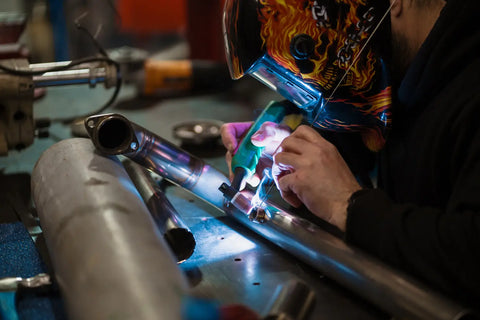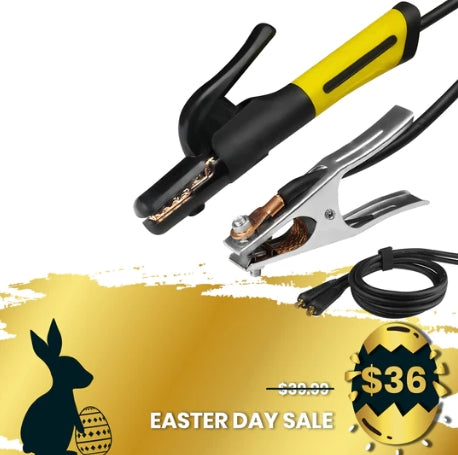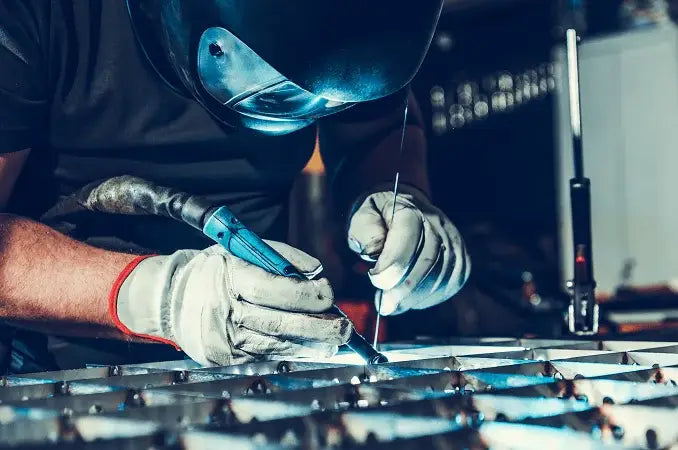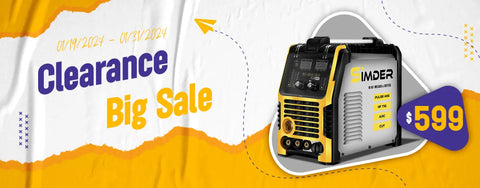TIG Welding Beginner Guide
Jan 25, 2024
What is TIG Welding?
Tungsten Inert Gas (TIG) welding is a versatile and precise welding technique that allows for clean and intricate welds.
To see more about TIG Welding, please click here.
What can TIG welding do?
 |
 |
| Maintenance and repair of household products | For work use or DIY art |
Why is tig welding so difficult and not friendly for beginner?
-
Precision and Control: TIG welding requires a high level of precision and control. The welder must manage the heat, control the arc length, and manipulate the filler metal simultaneously. This demands a steady hand and a good understanding of the welding process.
-
Dual-Hand Coordination: Unlike some other welding methods, TIG welding involves using both hands simultaneously – one hand holds the TIG torch, and the other feeds the filler rod. This dual-hand coordination can be challenging for beginners.

Source:factory.com
-
Thin Materials: TIG welding is commonly used for welding thinner materials, which can be more susceptible to warping and burn-through. Beginners might find it difficult to maintain the right balance of heat without damaging the material.
-
Learning Curve: TIG welding has a steeper learning curve compared to some other welding techniques. It takes time and practice to develop the necessary skills and achieve consistent, high-quality welds.
-
Equipment Setup: Setting up TIG welding equipment involves adjusting various parameters like gas flow, tungsten type, and amperage. Beginners may find this initial setup complex compared to simpler welding methods.
What you need to TIG weld
To TIG weld, you'll need the following essential equipment and materials:
1.TIG Welding Machine: This is the primary tool that produces the electric arc necessary for welding. It provides the power and controls for the welding process.
Don’t lose confidence because of these difficulties. Although tig welding requires proficiency and skills, SSimder has specially selected a machine for you.
MIG-250D is a multi-process aluminum MIG Welder Machine,200Amps, 110V/220V Dual Voltage, Support Gas MIG(Aluminum Welding)/Flux Cored MIG/Stick/ Lift TIG function(*Spool Gun Supported)
2.TIG Torch: The TIG torch is the handheld device that holds the tungsten electrode and allows you to control the welding process. It also delivers the shielding gas to protect the weld area.

TIG Welding Torch WP-17V TIG Torch Kit
3.Tungsten Electrode: TIG welding uses a non-consumable tungsten electrode to create the arc. The type of tungsten electrode chosen depends on the material being welded.

4.Shielding Gas: TIG welding requires a shielding gas to protect the weld pool from atmospheric contamination. Argon is commonly used as the shielding gas for TIG welding.
5.Gas Regulator: A regulator controls the flow of shielding gas from the cylinder to the TIG torch at a consistent pressure.
6.Filler Metal: In some TIG welding applications, you may need to use a filler rod to add material to the weld. The type of filler metal depends on the base metal being welded.
7.Welding Gloves and Helmet: Personal protective equipment (PPE) is crucial for safety. Welding gloves protect your hands from heat, and a welding helmet with a darkened visor protects your eyes from the intense light produced during welding.
Auto Darkening True View Welding Helmet RL-500L
8.Workpiece and Clamps: Securely hold the workpiece in place using clamps to ensure stability during welding.

Heavy Duty Electrode Holder & Ground Clamp Pack
9.Foot Pedal

TIG Foot Pedal Remote Amperage Controller
Please note: this pedalfoot switch is specially designed for our SD-4050Pro and Upgraded SD-4050Pro(2024)
Start Practice
Starting with TIG welding can be challenging, but with the right approach, you can set yourself up for success. Here are some tips for a successful start to TIG welding:
1.Practice on Scrap Metal: Begin your TIG welding journey by practicing on scrap metal. This allows you to get a feel for the welding process, experiment with settings, and refine your technique without the pressure of working on a critical project.
2.Master Hand Coordination: TIG welding involves using both hands simultaneously – one to control the torch and the other to feed the filler rod. Practice hand coordination to achieve smooth and controlled welds.
3.Perfect Your Tungsten Grinding: Properly prepare and sharpen your tungsten electrode using a grinder. A well-prepared electrode contributes to a stable arc and cleaner welds.

Source:dizz.com
4.Control the Heat: TIG welding requires precise control of heat. Avoid overheating the material, which can lead to warping or burn-through. Practice maintaining a consistent arc length and adjust the amperage accordingly.
5.Focus on Technique: Emphasize proper welding technique over speed. Slow and steady movements often result in better welds. Pay attention to details such as travel speed, torch angle, and filler rod manipulation.
6.Use Proper Safety Gear: Always wear appropriate personal protective equipment (PPE), including welding gloves, a welding helmet with a darkened visor, and flame-resistant clothing.
7.Learn from Mistakes: Mistakes are part of the learning process. Analyze your welds, identify areas for improvement, and learn from each experience.
8.Be Patient and Persistent: TIG welding can be challenging at first, but persistence pays off. Be patient with yourself, practice regularly, and celebrate small successes along the way.

Clearance Big Sale is On! Enjoy lowest price for SD-4050Pro & MIG-250D




